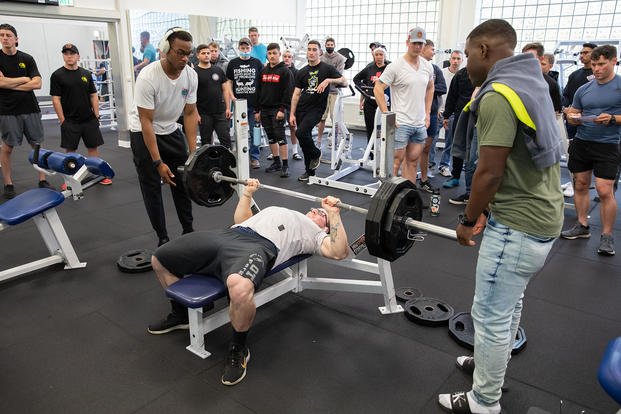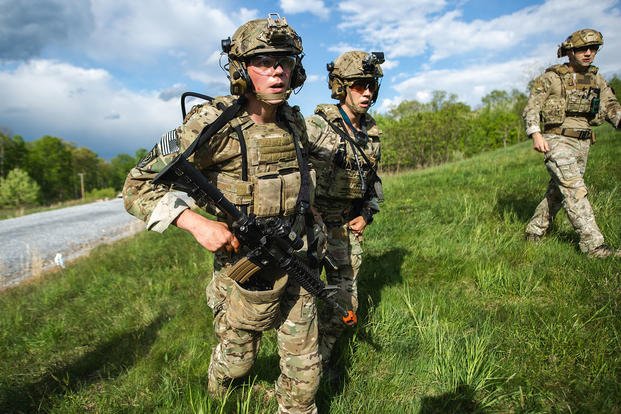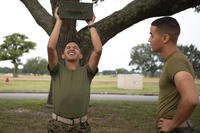Here is a common misconception concerning military and law enforcement training programs. People often show up on day one not in any kind of shape to start off on a group run. Many are overweight, with deconditioned muscles and joints that can't handle any physical activity for long periods of time.
Here is an email I recently received:
Hi, Stew. I am in the process of applying to the military and was wondering how much I should work out before attending boot camp? I mean, don't they get you in shape?
Ouch. It is this type of thinking that causes so many people each year to leave their training programs either injured or unable to pass minimum fitness standards. Not to mention, the extra stress of remedial PT and running programs eat any of your spare time you might have to relax. More often than not, the remedial programs and added physical stress distract you from learning your profession. This occurs for only one reason. You lacked a good preparation strategy.
Any time you make changes in your life, you have to have a plan. Joining the military or law enforcement is very similar. Your job before you start training is to get in shape and well within height and weight standards.
Here are what I call the "Ten Commandments of Preparation to Serve:"
1. Be Motivated
It is not my job to motivate you to serve your country. You have to be motivated and understand that your fitness level could be the difference between life and death for you, your partner or a victim you are attempting to save.
2. Develop Upper-Body Strength Before You Get There
Make sure you can do push-ups, sit-ups and pull-ups of some form. These exercises will help you climb fences or rope, jump walls and handle an opponent, if needed. Practice with weights, walls, ropes and fences. Do not assume that you can accomplish these skills without practice. See PT/weights articles.

3. No Minimum Standards
It is your job to use or create a plan that will prepare you well within the minimum physical standards of the unit you serve. Minimum standards never helped anyone excel in training. They are like getting a "D" in class. It is passing, but getting through to the next level of training is going to require much more work. Statistics show the better you score on the entrance fitness test, the better you are at completing the course of instruction well.
4. Be Able to Run
You do not have to have marathon experience, but a minimum of 15-20 miles a week is a great base to handle your training programs without overuse injuries, such as shin splints, stress fractures, joint tendinitis and others. See running articles/prevention injuries.
5. Know the Specialty Tests
Each unit has certain tests you will have to pass. Do the research and find out what is expected of you during and after training. For instance, if you are planning on joining the Navy, practice swimming. If you want to join the Army, run and put a backpack on and walk fast (ruck march). Many law enforcement agencies require some form of obstacle course or job-related standards test, so practice running stairs, sprints, climbing walls and dragging a body. See ideas in the Fitness Store or article archive.

6. Be a Team Player
When you are going through training, you will be assessed on how well you work with others. Following orders as well as developing ideas and sharing them with your team are critical skills that you should learn to perform without thinking. If you are in high school, play team sports, join the band and become involved in community action groups. Do something to learn these skills now.
7. Learn the Ranks
This is a little less physically demanding, but if you do not know the ranking system as well as other historical information about your unit, its famous people and its heroes, it is likely you will pay the price in push-ups and other extra physically demanding duties. There is a saying in many training programs, "If you are going to be stupid, you better be strong."
8. Eat Right for Energy (Not Drink)
Eating good carbohydrates and protein-rich foods, such as fruits, vegetables and lean meats, is the best tool for energy to exercise and prepare physically for training. Too many people rely on energy drinks, which are really just caffeine and sugar to spike your central nervous system. They don't provide proper sustainable fuel for workouts. See food plan for ideas.
9. Show Up Within Weight Standards
Being heavy or overweight likely will challenge you to work harder when running, doing obstacle courses and staying up with the class physically. If you are one of those bigger-muscle guys, your strength and power will come in handy, but do not let it hamper your cardiovascular endurance. Big guys can run a mile in a six- to seven-minute pace, too; you just have to work at it before your training.
10. Did I Mention Run?
Make sure you can run. You will run from one place to another, usually carrying your gear for that event. Running injuries are typically the main issue for people attending boot camps, spec-ops units and police academies. See running plan ideas.
Being strong on day one will better ensure that you will be trained to protect the weak. Thanks for your decision or contemplation of serving your country. Good luck with your program, and I hope you see improvement soon.
Stew Smith is a former Navy SEAL and fitness author certified as a Strength and Conditioning Specialist (CSCS) with the National Strength and Conditioning Association. Visit his Fitness eBook store if you're looking to start a workout program to create a healthy lifestyle. Send your fitness questions to stew@stewsmith.com.
Want to Learn More About Military Life?
Whether you're thinking of joining the military, looking for fitness and basic training tips, or keeping up with military life and benefits, Military.com has you covered. Subscribe to Military.com to have military news, updates and resources delivered directly to your inbox.



















